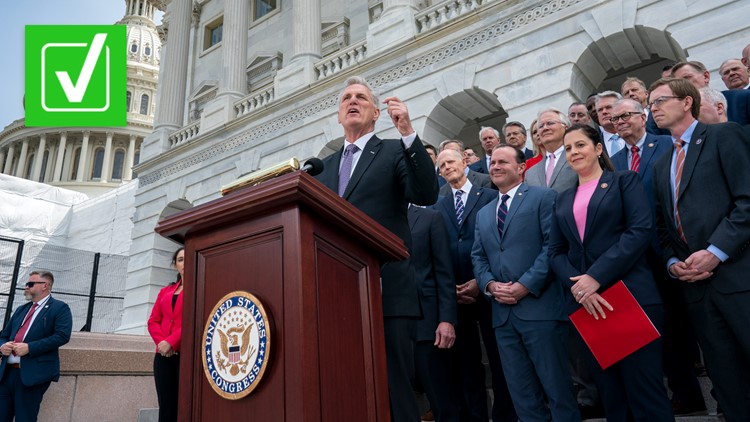House Republicans say they won’t lift the debt ceiling unless President Biden agrees to cut spending. Viewers asked whether they had the same demands for Trump.


The United States has hit the debt ceiling and is potentially only a few weeks away from defaulting on its debt.
The Treasury Department is running out of money to pay the bills Congress already authorized, and it needs to borrow more, but it can’t do that unless Congress raises the debt ceiling.
Congressional Republicans – who hold a majority in the House of Representatives – say they won’t vote to raise the debt ceiling unless the bill also comes with significant spending cuts, a proposal President Biden has rejected.
VERIFY viewer Andy heard that when Donald Trump was president, Republicans lifted the debt ceiling multiple times without any strings attached, and wanted to know if that was true.
THE QUESTION
Did Congressional Republicans vote to lift the debt ceiling, without spending cuts, during the Trump administration?
THE SOURCES
THE ANSWER
![]()
Yes, during the Trump administration Congressional Republicans voted multiple times to lift the debt ceiling without spending cuts.
WHAT WE FOUND
The debt limit has been lifted 78 times since 1960 — 49 times under a Republican president and 29 times under a Democrat — according to the Treasury Department.
Three of those times were during the Trump administration. In 2017, 2018, and 2019 Congress approved measures to lift the ceiling shortly before it was reached.
All three times, Congress didn’t vote to raise the limit by a specific amount, the way they usually do, and the way they most recently did in 2021 when Biden was in office. Instead, they voted to suspend the limit altogether, allowing the Treasury to borrow the funds it needed at will.
Then, when the suspension was over, a new ceiling was automatically installed based on how much the Treasury had borrowed in the interim.
As a result, the debt ceiling rose by several trillion dollars during Trump’s term.
None of the suspension bills included the kinds of cuts to federal spending that Republicans are now calling for. In fact, spending increased by roughly $3 trillion during Trump’s time in office, due in large part to the federal government’s pandemic response.
Some of the bills included spending “offsets,” but budget analysis groups like the Committee for a Responsible Federal Budget labeled these largely as “budget gimmicks” that had no real impact on spending.
Democrats have sometimes voted against debt ceiling increases when there was a Republican president. Biden himself, while serving in the senate, opposed an increase in 2003, when George W. Bush was in office. However, Democrats did not control the House or Senate at the time, and did not use the filibuster to prevent the increase from passing, which it did.
Since 2000, Democrats have held either the House or Senate under a Republican president three times: between 2000-2002, between 2006-2008, and between 2018-2020.
Between 2000 and 2002, there were no debt limit increases needed.
Between 2006 and 2008, there was only one vote to raise the debt ceiling. It passed with members of both parties voting for and against.
Between 2018 and 2020, the aforementioned debt ceiling bills in 2018 and 2019 passed with bipartisan support.
The VERIFY team works to separate fact from fiction so that you can understand what is true and false. Please consider subscribing to our daily newsletter, text alerts and our YouTube channel. You can also follow us on Snapchat, Twitter, Instagram, Facebook and TikTok. Learn More »
Follow Us
Want something VERIFIED?
Text: 202-410-8808
.png)









 English (US) ·
English (US) ·